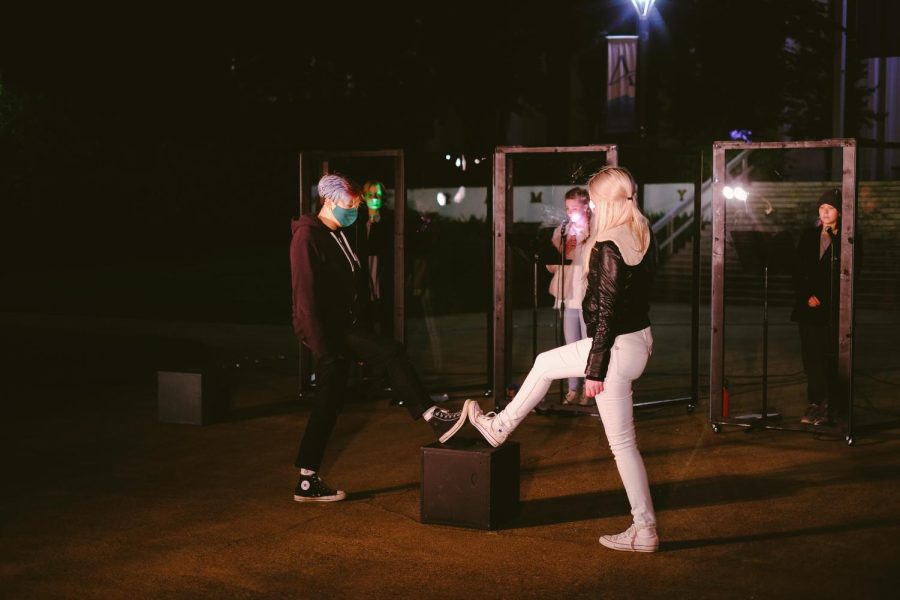The Show Must Go On: Theater During a Pandemic
January 21, 2022
As we approach nearly three years of the COVID-19 pandemic, we continue to have to adapt and change. Among the areas most affected by this pandemic is live theater as theaters have closed and had to adapt worldwide all the way from Broadway to local theater.
At the beginning of the pandemic, with so much fear and uncertainty, many productions, not only at UNC Asheville but worldwide, were canceled and many theaters shut down completely. Finding solutions, specifically in a college academic setting, whether temporary or permanent for the problems brought forth by the pandemic, has been difficult and a definite learning process.
“There was so much that was unknown when it first started. We had a lot of problems because it was shutting down theaters all over the world,” said Robert Bowen, UNCA professor of drama.
The drama department at UNCA has had to adapt quickly and efficiently to ensure the best possible learning and performing experiences for involved students and faculty. Strategies that have been and are being employed to ensure safety and continue the theater program as best and efficiently as possible are varied and numerous. These strategies include masks, social distancing, online formats and mediums, the use of outdoor spaces, and many more.
“Theater is live. It’s required to be live. We couldn’t do things live with a live audience, which is very difficult for theater students to be able to interact with an audience,” Bowen said. “What it would do for us as far as an education process goes is it would restrict what our students could do.”
Despite all the barriers to live theater and theater education the pandemic has presented, the drama department has put on many productions via a myriad of mediums. Radio, Zoom, recordings and modified live performances served as just some of the ways the department adapted to pandemic-related challenges.
Dallon Allen, a UNCA student who participated in the theater program during the 2020-21 school year, said the department put on a unique outdoor performance of a modified version of Arthur Miller’s All My Sons.
“We double cast each part, and one person would do the action and the other person would be in the back saying the lines, and we switched this halfway through,” Allen said. “Another really big COVID change was each character got their own area. We just had plain wooden boxes and each character was pretty much tied to their box.”
When describing the specific changes to the script and source material due to COVID involved in this performance, Allen said chosen scenes from the piece still carried the message and purpose of the performance to the audience.
“I think the biggest change was there was a kiss scene in the play, and obviously that’s a little bit hard when you have to be six feet apart. We ended up using our feet and just touching feet on the platforms,” Allen said.
Bowen said the department experienced many specific struggles during the pandemic, including the primary issue of limited interaction between those involved with theater productions. Interaction between the actors and the technical crew, as well as interaction and connection between the cast and the audience, proved difficult considering COVID protocols.
He said the limited direct connection between all people involved in the production modified the experience.
“It denied the opportunity for the performers to have instant reaction with an audience,” Bowen said. “The people who are suffering probably more than the actors actually are the technicians because we don’t get to see realized shows.”
Though performances, classes and rehearsals were difficult and often underwent modification, some positives did come as a result of the circumstances created by the pandemic.
“Within theater, we have a very long tradition of making do with whatever we have,” said Robert Berls, UNCA assistant professor of drama. “In many respects, it was kind of like the worst thing and the best thing to happen at once because we really got to show our students this is the kind of can-do attitude that we have.”
Berls said within the classroom setting, especially online, he had to come up with creative ways to interact with students, as well as provide them with ways to substitute the lack of technical materials that would be utilized in person.
He described some of these creative methods such as using everyday objects as measuring substitutes, and engaging students in at-home projects that they could then share online with their classmates.
Regardless of the pandemic, the drama department adapted both learning and performances. Productions put on by the UNCA drama department included shows such as Radium Girls, Everyone, All My Sons, The Three Pigs and the Red Line and more, all performed using a variety of mediums to best adapt to the restrictions of the pandemic.
Upcoming productions and opportunities from the department for the spring semester include Drip, Drip, Drop: A WATER Adventure and Shakespeare’s Twelfth Night‘ as well as an acting intensive, Embodying Shakespeare’s Text.


![Brooke Pedersen [second from the right] and Luis Reyes [right] hold banners during the Wrap The Woods event.](https://thebluebanner.net/wp-content/uploads/2025/09/ELIZABETH_PRITCHITT_IMG_3470-1200x804.jpg)
















